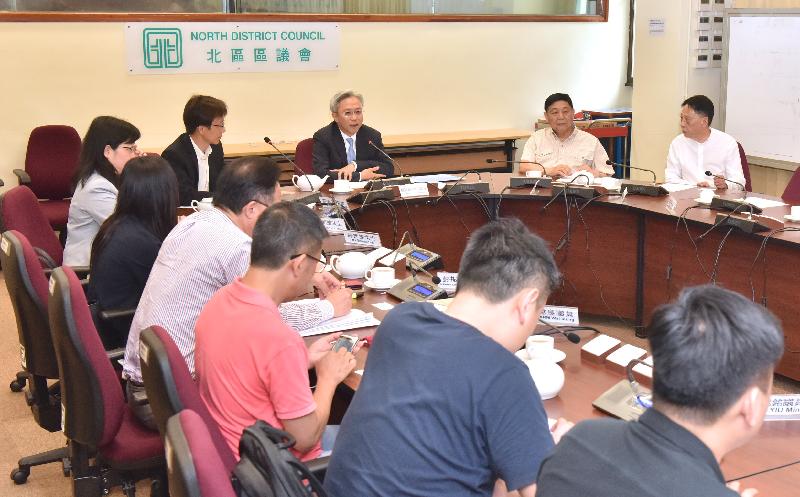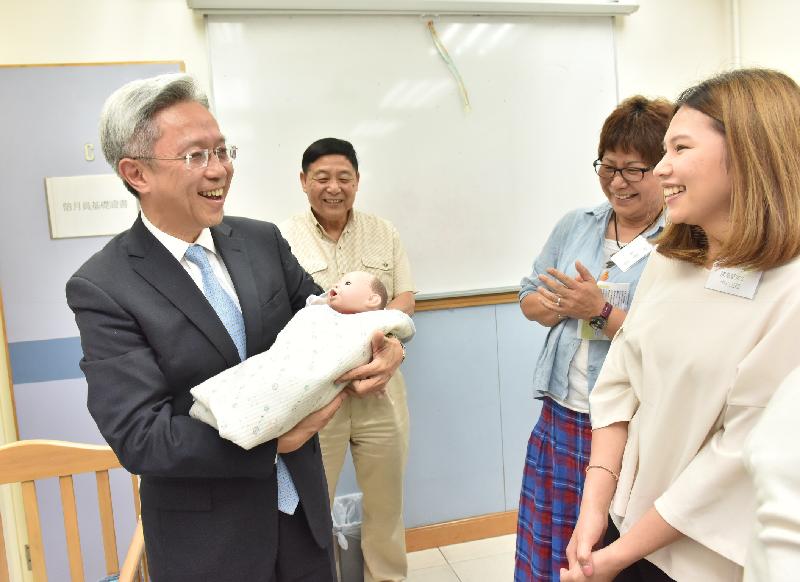Following is a question by the Hon Ip Kin-yuen and a written reply by the Secretary for Education, Mr Kevin Yeung, in the Legislative Council today (May 16):
Question:
Since the 2009/10 school year, special schools have offered 12-year education for students with intellectual disability. As individual students may need to have their years of study extended due to various reasons, the Education Bureau (EDB) has, from the 2010/11 school year onwards, progressively implemented improvement measures to cater for the extension of students’ years of study. As additional classrooms and facilities are involved, EDB has stated that it will implement the improvement measures progressively and will examine the carrying out of conversion works in some schools. In addition, starting from the 2017/18 school year, the EDB has provided additional allied health and nursing manpower in special schools to improve special education services. In this connection, will the Government inform this Council:
(1) in respect of each type of special schools in each of the past three years, of (i) the number of students waiting for enrolment (including those who changed schools) and the average waiting time, and (ii) the number of students waiting for boarding places and the average waiting time;
(2) in respect of each type of special schools, of a list of the schools and the costs of the conversion works involved, broken down by the progress of the works needed to be carried out (including (i) the authorities’ discussion with the schools on the works projects yet to commence, (ii) funding approval for the works being awaited, (iii) works in progress, and (iv) works completed);
(3) given that starting from this school year, the Government has provided an occupational therapist and an occupational therapist assistant for each special school for children with mild intellectual disability, moderate intellectual disability and visual impairment, of the conditions of service of such posts, and the average post-to-student ratio;
(4) among each type of special schools, of the number of schools that have recruited sufficient manpower to fill the posts mentioned in (3) at present, the total number of in-service allied health staff members, and the total number of vacancies of allied health posts;
(5) as quite a number of schools have relayed that they have experienced difficulties in recruiting occupational therapists, whether the authorities have approached those schools to find out the reasons for that, and whether they will review the salaries and conditions of service of the relevant posts in order to attract such type of professionals to take up the posts; if so, of the details; if not, the reasons for that; and
(6) apart from providing additional allied health manpower in special schools, whether the EDB has provided such schools with related facilities and equipment (e.g. dedicated special rooms or treatment rooms, occupational therapy equipment), so that such staff members may arrange on-campus treatment and movement training for students; if so, of the details; if not, the reasons for that?
Reply:
President,
To enhance the quality of education, the EDB has all along been reviewing the development and resource of special education and introducing viable improvement measures as necessary in accordance with education professionalism and the learning needs of students. The Government has been increasing resource input for special education. Over the five financial years from 2013-14 to 2018-19, the funding allocation increased by 50 per cent from over $1.8 billion to over $2.7 billion.
Since assuming office, the current-term Government has provided additional teaching and allied health manpower and resources, such as occupational therapists (OT) and speech therapists (ST), to improve the special education services. It has been announced in the 2018-19 Budget that the Government will improve the provision of school nurses and social workers of special schools from the 2018/19 school year. Moreover, the EDB has been actively improving the premises and facilities of special schools through various viable means, including conversion/addition, reprovisioning or in-situ redevelopment, to provide a better learning environment to students of special schools.
Our reply to the questions raised by the Hon Ip Kin-yuen is as follows:
(1) Overall speaking, there are sufficient special school places presently. The EDB will, subject to the assessment and recommendation of specialists and the consent of parents, refer students with more severe or multiple disabilities to special schools. Basically, if parents follow the placement arrangement to special schools made by the EDB for their children, waiting for school places is not required.
As regards boarding places of special schools, the number of students waiting for boarding places in the past three school years from 2014/15 to 2016/17, as at September 15 of each school year, is set out at Table 1. The figures include cases with boarding places allocated who are going through the procedure for admission, cases deferring admission on the request of parents and cases waiting for alternative boarding placement after parents’ refusal of the initial offer made by the EDB.
Table 1: Number of students waiting for boarding places of special schools
| Type of school |
2014/15 |
2015/16 |
2016/17 |
|---|
| School for children with visual impairment (VI) |
4 |
0 |
0 |
| School for children with physical disability (PD) |
34 |
27 |
26 |
| School for children with moderate intellectual disability (MoID) |
117 |
101 |
113 |
| School for children with severe intellectual disability (SID) |
13 |
16 |
14 |
The average waiting time for boarding places of special schools from the 2014/15 to 2016/17 school years is set out at Table 2.
Table 2: Average waiting time for boarding places of special schools
| Type of school |
Average waiting time (Year) |
|---|
| School for children with VI |
0.1 |
| School for children with PD |
0.5 |
| School for children with MoID |
1.4 |
| School for children with SID |
0.2 |
In the calculation of the average waiting time, we have taken into account the cases of students who had been allocated a boarding place towards the end of a school term/year but their parents had requested to postpone admission for better adaptation and integration of the students. The time spent under such circumstances had also been counted.
The EDB has been closely monitoring the supply and demand of boarding places in special schools and exploring feasible ways to increase the supply with reference to the actual demand. Currently, the overall supply of boarding places for different types of special schools is sufficient to meet the demand, except for schools for children with MoID. In this connection, the EDB has made optimal use of the space available in the boarding sections of schools for children with MoID, where relevant ordinances and regulations permit, for provision of additional boarding places in recent years. In addition, we have explored new measures with a view to increasing the provision. For instance, in the 2017/18 school year, we have piloted the operation of two MoID classes with 20 boarding places in a school for children with SID. Also, some new school projects are in the pipeline. Subject to the funding approval and the timely completion of the construction works, the number of boarding places for students with MoID will be increased to around 400 in the 2020/21 school year.
(2) The EDB has carried out 43 improvement works to address the circumstances and needs of individual special schools. To ensure that school needs are catered for properly, the EDB has all along maintained close liaison and communication with the schools concerned to gauge their views on the design, details and arrangements of the works. During the implementation of the projects, consultants are required to submit layout plans and design proposals to relevant government departments for vetting and approval with a view to complying with relevant statutory requirements. For those projects involving more complicated issues such as lease modification, it will take longer time to process. As at April 2018, 18 special school improvement projects have been completed, involving a total estimated expenditure of about $171.60 million, and another 25 projects are being implemented at different works stages. The actual amount of funding required for these projects will be determined after the project details are finalised.
(3) Starting from the 2017/18 school year, schools for children with mild intellectual disability (MiID), schools for children with MoID, the school for children with VI and the school for children with hearing impairment (HI) operating six or more approved classes are provided with one occupational therapist II (OT II) and one occupational therapist assistant (OTA). Regarding schools for children with MiID and MoID, each section operating six or more approved classes are provided with one OT II and one OTA respectively. As at September 2017, the salary scale for OT II and OTA is as follows:
| Post |
Salary scale |
| Occupational therapist II |
$27,485 – $44,415 |
| Occupational therapist assistant |
$18,205 – $28,865 |
(4) In the 2017/18 school year, there are 39 OT II/OTA posts in 34 schools for children with MiID, schools for children with MoID, the school for children with VI and the school for children with HI. We learnt that, as at April 2018, 29 out of these 34 schools employed an OT and/or frozen the post to obtain a cash grant for recruiting temporary staff and hiring the related service. The remaining five schools have six OT vacancies but they neither recruited any OT nor applied for the cash grant. One school froze only one out of two OT posts. In other words, there are seven OT vacancies. As for the manpower of OTA, 26 schools are at full or partial strength while eight schools have yet to recruit such staff, involving a total of 11.2 posts.
(5) OT of special schools are remunerated by the Salaries Grant on a pay scale linked to that of the civil service. Their pay and conditions of service are set according to the established mechanism of the Government. The EDB maintains communication with individual special schools and the Hong Kong Special Schools Council through various channels to learn about their difficulties in recruiting OT. In view of the keen demand for OT, the fundamental solution lies in increasing the overall supply of manpower through training. In this connection, the EDB has requested universities to increase their training capacity and encouraged self-financing post-secondary education sector to offer designated programmes, including nursing programmes through the Study Subsidy Scheme for Designated Professions/Sectors to nurture talent in support of specific industries with keen demand for human resources. For the meantime, to alleviate the difficulties in recruiting OT, special schools may choose to freeze some of the OT vacancies in exchange for cash grant to recruit temporary staff or hire related services.
(6) Students of schools for children with MiID, schools for children with MoID, the school for children with VI and the school for children with HI often display weaknesses in their fine motor skills and eye-hand coordination which require the support of OT. Generally speaking, schools can make available OT to support students through direct (such as individual/group OT sessions) and indirect (such as in-class teaching and learning activities) intervention. The said intervention services will enable needy students to develop and improve their fine motor skills and eye-hand coordination through individualised daily learning activities in the school environment. Schools can make flexible use of the existing hardware to offer OT service to their students. If necessary, schools can also make use of the Expanded Operating Expenses Block Grant as well as the Composite Furniture and Equipment Grant to procure the equipment needed for the therapy.
read more



